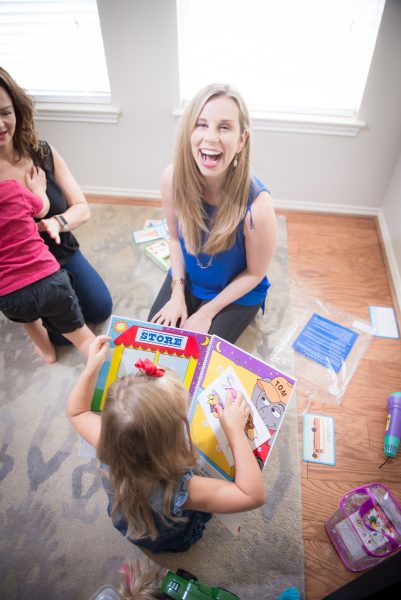
“Late talkers”
Late Talkers are a group of children who otherwise show age appropriate receptive language skills (understanding of language), nonverbal IQ, and typical social development/personality. However, these children are behind in their expressive language skills. In their book, “The Late Talker,” the authors report that by the age of 24 months, 15% of children from low income families and 7% of middle-class homes have an expressive language delay. Studies show that 50% of those children are likely to catch up by the age of three, even without intervention, and another 25% will have normal speech by the time school starts. That leaves 25% of children who will not grow out of their problem before starting school!
“Talking is normal and not talking is not. While this may seem obvious, too often a child is treated as if speech will begin when the child is ready. Few physicians, confronted by a boy who is old enough to walk, but who isn’t would confront the mother by saying, “Well he’ll walk when he’s ready.” Speech and language occur within a certain range of time, and should not be dismissed as if the child will simply talk when ready.” (Blager cited in Zelazo et al, 2014)
“Late talkers” who do not get early treatment are at an increased risk for:
Language-based disabilities
Academic failure
Social rejection
Behavior and self-esteem problems
Anxiety Disorders
Juvenile delinquency
(Source: The Late Talker- Agin, Geng, and Nicholl)
Late talkers and learning
Studies show that “late talkers” do not perform as well as their peers in certain aspects of language use such as language complexity and grammar. These skills are linked with later academic success. As they enter kindergarten, children with language delays struggle in the areas of phonological awareness, narrative development, grammatical skills, and social skills (Paul, 1996). Other studies show that although late talkers do not differ in their reading decoding skills when they are learning to read (ages 6 and 7), these children are significantly behind their peers at the ages of 8-9, when instruction shifts to “reading to learn.” They also have continued difficulty with reading comprehension skills at the age of 13 (Rescorla 2002) and significantly more difficulty with language syntax (structure) and comprehension, both of which are necessary skills for written language (Rescorla & Turner, 2015).
Childhood Apraxia of Speech
A small percentage (estimated 3-5%) of “late talkers” may exhibit signs of a motor speech disorder called Childhood Apraxia of Speech. CAS is a neurological condition in which your child knows what he wants to say, but cannot get the message from their brain to their mouth. Signs of CAS include:
- Not cooing or babbling as infant
- Late first words and may be missing several sounds
- Only a few consonants and vowel sounds
- Problems combining sounds; may have long pauses between sounds
- May have problems eating
- Simplifies words by replacing difficult sounds with easier ones or deleting difficult sounds
(Source: American Speech and Hearing Association)

How do we define “late talker”
According to The Hanen Center, the following guidelines can be used to determine if a child is a “late talker”:
18-20 months: less than 24 words
21-24 months: less than 40 words
24-30 months: less than 100 months
OR is not using word combinations by 24 months
Has relatively good comprehension, play, social, motor, and cognitive skills.
Plus the presence of two or more risk factors
What are the risk factors
In a study led by Lesley B. Olswang of the University of Washington, the following predictors and risk factors correlate with toddlers at risk for continued language impairment. The more of these warning signs your child exhibits, the greater the need for speech therapy.
- Limited babbling as a baby
- Limited use of verbs
- Limited consonant sounds:By the age of 24 months, a child who only uses 4-5 consonants and a limited number of vowels is at risk for continued delay.
- Limited imitation of words: Children in the “first word combination stage” (18-30 months) use imitation as a predominate strategy in language learning (Wetherby, 2000)
- Limited play: Toddlers who are not using toys together in a meaningful way or using objects symbolically are at increased risk for continued delay
- Limited use of gestures: By 12 months, children should point to objects and use at least six of the following gestures: giving, pushing away, raising their arms, showing, reaching, waving and shaking their head “no.”
- Difficulty with social skills: Children who prefer to initiate conversations with adults rather than peers and have behavior problems are less likely to outgrow a disorder. According to Rescrola and Ratner, children with language delays rely more on unclear vocalizations, noises, gestures, and actions to communicate.
- Heredity: If a child’s parent or sibling has a language impairment, there’s a high risk of continued delay
- Otitis Media: Otitis Media is an acute ear infection that often leaves behind fluid in the ears. Recurrent infections are associated with a language delay
- Parental Characteristics: Children from low SES families are more at risk for language delays. Parental style also plays a role. Parents who follow their child’s lead and provide language stimulation can help their child’s language skills develop.
In general, the more of these warning signs you notice, the more your child would benefit from speech therapy. It’s also helpful to take into account your toddler’s frustration level. If your little one is frequently experiencing frustration or having temper tantrums because they can’t communicate, it may be beneficial to work with a Speech-Pathologist. Also, trust your gut! If your parental intuition is telling you something is wrong, there is nothing wrong with pursuing an evaluation! At the very least, you will gain peace of mind that your child’s development is on track.
What can we do for “late talkers”?
When a child’s profile is positive for risk factors for ongoing speech and language delay, a proactive approach is warranted (Olswang et al 1998, Paul & Roth, 2011). In fact, research shows that spoken language can be significantly accelerated with intervention! (Finestack & Fey, 2013). Within the first 5 years of the life, the brain has the most plasticity. That means we can actually reinforce existing synaptic connections and create new ones. We can essentially rewire the brain! That is why it is so important to start intervention early. Research shows the earlier intervention is started, the better the outcome.
Parent involvement is essential in early intervention. A Speech Pathologist will work with you teach you ways to encourage language development during everyday routines and interactions. By working with an SLP to learn and implement language building strategies, you can help your child become a confident communicator. Remember, you are your child’s best teacher!
Resources:
http://www.hanen.org/SiteAssets/Helpful-Info/Research-Summary/TW-research-summary-pages-1-0-0.aspx
Agin M., Geng, L., and Nicholl M. “The Late Talker- What To Do if Your Child Isn’t Talking Yet.” New York, 2003
www.apraxia-kids.org
 Brooke Andrews, M.A. CCC-SLP is owner of The Speech Dynamic. Brooke specializes in speech and language development to toddlers and preschoolers and provides in-home speech therapy to families in Houston.
Brooke Andrews, M.A. CCC-SLP is owner of The Speech Dynamic. Brooke specializes in speech and language development to toddlers and preschoolers and provides in-home speech therapy to families in Houston.






